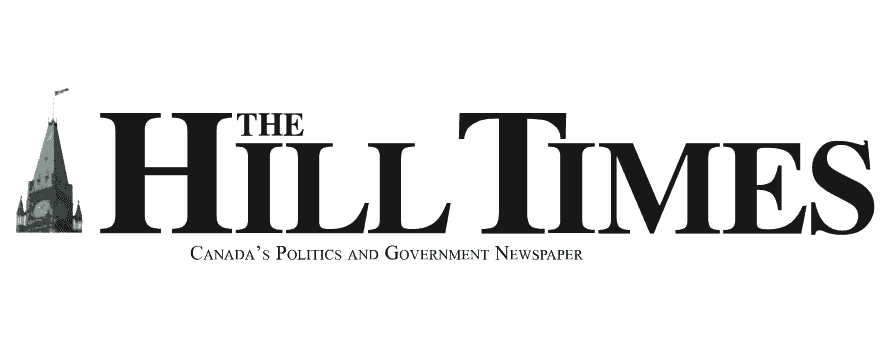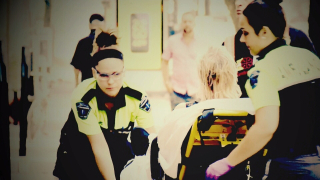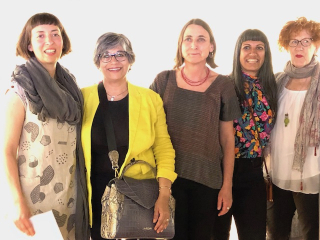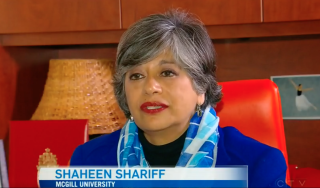James McGill Professor and Project Director of iMPACTS, Professor Shaheen Shariff has been interviewed and quoted on topics ranging from sexual assault, rape culture, cyberbullying, and the law in both national and international press. Read more below.
To request an interview, please definetheline [at] mcgill.ca (send us an email).
Professor Shaheen Shariff Interviewed about Canada's Proposed Online Harms Bill
CityNews 570, March 13, 2024
Professor Shaheen Shariff, James McGill Professor and Director of iMPACTS, was interviewed by Mike Farwell for CityNews 570, a radio station based out of Kitchener, Ontario, to discuss Canada's recently proposed online harms bill. In the interview, Professor Shariff expressed concerns about the potential changes to the Criminal Code, including the penalties associated with hate crimes.
Growing issue of violence and harassment faced by women in politics
Your World Tonight, March 8, 2024
A recent report by the Fédération québécoise des municipalités found that almost 40% of municipal councillors in the province of Québec are women, however, barriers still exist to reaching gender parity, including in-person and online harassment. In order to address these concerns, Professor Shaheen Shariff says that elected officials need more support. "What's missing is the procedures and policies in place to deal with it."
Cyberbullying more common for adults than children during pandemic, say experts
The Hill Times, May 11, 2022
Professor Shariff was interviewed about cyberbullying and technology-facilitated violence (TFV), and she explained that online distribution of non-consensual intimate images has increased during the pandemic. "As social media use increased, so did the spread of hate, TFV, cyberbullying, and non-consensual distribution of intimate images. As such, people have become much more aware, especially with increases in polarized hate, misogyny, homophobia, as well as politically driven fake news."
Halifax professor Wayne Hankey kept in classroom despite decades of transgressions
Chronicle Herald, April 9, 2021
“Quite often at universities and in academia, you have stars who have succeeded academically and . . . have become globally well known,” said Professor Shariff. “Some attain a sort of reverence, a kind of power. But there is never an excuse for allowing someone to continue to perpetrate sexual violence. Especially against students who are in a vulnerable position.”
8 years after death of Amanda Todd, her mother speaks out in new cyberbullying documentary
CBC News, October 10, 2020
Professor Shaheen Shariff said she would also like to see children receive more education in school about cyberbullying and the mental health impact. This, she told CBC News, can be woven into the curriculum by using art and music classes to vent frustrations creatively, and by working in mental health and suicide statistics into math courses.
Tinder date threatened to share nude photos if woman didn't agree to sex, warrant alleges
CBC News, September 17, 2018
"It's devastating and we deal with the survivors of this kind of sexual extortion and violence all the time," said Professor Shaheen Shariff who has published widely on cyberbullying and sexting. "It's taking a while for institutions to accept that online sexual violence of this type is as harmful as actual physical violence."
I Was Harassed for My Interracial Relationship—So I Tracked Down My Troll
Flare Magazine, April 5, 2018
Professor Shariff says our legal system still needs to come up with better ways to address this problem, including providing support for victims—and appropriate ramifications for perpetrators. “There’s too many cases where I’ve heard about insufficient evidence to move forward,” Shariff says. She adds that while closing a case may simply mark the end of an investigation for the police, it doesn’t address “the huge impact it can have on victims or survivors of any kind of harassment.”
Interview with Professor Shaheen Shariff about Hate on Social Media
Sloan & Science, December 28, 2017
"We’re at a crossroads where all of these nuances need to be worked out. It’s unprecedented. The law hasn’t been able to keep up. Social media plays two roles: on the one hand, it is powerful in mobilizing a sea change in awareness. On the other hand, in the past–and it continues in some ways–it tacitly condones some of these institutional barriers."
Violence sexuelle : des frontières difficiles à définir
La Presse - Opinion Piece, November 1, 2016
« Cependant, si l'on souhaite réduire et prévenir la violence sexuelle dans une société de plus en plus multiculturelle et mondialisée (en ligne et hors ligne), il est essentiel de mettre au jour et de démonter les formes de discrimination croisées telles que le sexisme, la misogynie, le racisme et l'homophobie qui perpétuent et normalisent la violence sexuelle. »
Professor Shariff on rape culture on university campuses
McGill Reporter, September 28, 2016
"Rape culture is rooted in intersecting forms of discrimination that impact some members of society more negatively. We wanted to know the extent to which arts, popular culture, news and social media might: a) tacitly condone rape culture in universities given that students are their largest consumers; or b) have the power to mobilize change; c) what legal and policy barriers exist and what legal frameworks are most applicable."
McGill Talks: Rape Culture
McGill University, November 26, 2015
The term rape culture is now commonplace in the news. What does it denote, how pervasive is it, and what should be done? To discuss are Professor Shaheen Shariff, an internationally recognized expert on sexting and cyber-bullying in the Department of Integrated Studies in Education, and Professor Carrie Rentschler, former Director of the McGill Institute for Gender, Sexuality and Feminist Studies. Bianca Tétrault is the Harm Reduction Officer in the Office of the Dean of Students at McGill. Moderated by Jacquie Rourke.
Two teens due in court after alleged murder plot uncovered in St-Hyacinthe
CTV News, September 18, 2016
"What's public, what's private? Where are the lines? Where your communication can cross over to become illegal now, there are laws now against some types of online postings."
Quebec Human Rights Commission denounces public misogyny
Montreal Gazette, March 26, 2015
Profess Shariff explained, “We are finding people are saying they aren’t thinking about victims or who they are hurting, they just want to get hits and make people laugh. … But what this is is a slap in the face to women. The more powerful women become, and the more equal in terms of occupations and status and sexual liberation, the more violent the behaviour. It is a backlash.”

Canada's cyberbullying bill
CGTN America, December 24, 2013
Professor Shaheen Shariff discusses the recent proposed laws in regards to cyberbulling in Canada.
Cyber-abuse and bullying
Al Jazeera, October 31, 2011
What can be done to end bullying and cyber-abuse? Guests Professor Shaheen Shariff and Latoya discuss strategies to address different forms of online harm.
Experts concerned by Ottawa's attempts to rein in hate speech
Toronto Star, March 10, 2024
Canada's recently proposed legislation to address online harms includes amendments to the Criminal Code and the Canadian Human Rights Act. Professor Shaheen Shariff says courts and governments must be careful with applying harsher penalties for hate propaganda offences, including the promotion of genocide. "Who defines it? ... It's so subjective. How can we be more objective about what hate is in today's climate? There's very little agreement."
Cyberbullying may cause disordered eating in younger teens
The Washington Post, December 6, 2023
A recent study found that children who had been cyberbullied were twice as likely to exhibit disordered-eating symptoms. Professor Shaheen Shariff, who is known for her research on cyberbullying prevention, was not surprised by the study’s results. “Health issues are a pretty prevalent aspect of cyberbullying or bullying,” Shariff said. “There’s so much unkindness and competition and demeaning kinds of comments online.”
L’attrait des défis TikTok
(EN: The allure of TikTok challenges)
La Presse, July 18, 2022
Professor Shaheen Shariff talks about the potential harm that young people confront when using social media apps like TikTok. "It is difficult to supervise everything, but we must at least talk to children about the real risk of participating in these types of challenges."

New concerns about a rise in teen violence
Global News, May 12, 2022
Vancouver police issued a warning about a recent spate of teen swarming attacks. Cyberbullying expert Professor Shaheen Shariff discusses how bullying and toxic behaviour can spiral into violence.
How can universities best navigate a current range of controversial issues such as political correctness, and ensure informed dialogues?
MAUT McGill University, April 28, 2022
Hosted by the McGill Association of University Teachers (MAUT), Professor Axel van den Berg and Professor Shaheen Shariff participated in a debate where they talked about the role of universities in addressing controversial issues and promoting informed dialogues.
Opinion: The social media bullying crisis children face
National Post, December 3, 2021
"Children’s negative interactions online are shaped by the physical and online adult world which normalizes high levels of online hate and violence. Instead of focusing exclusively on the symptoms of bullying and cyberbullying, we must progress towards an examination of the roots of these actions."
Why the pandemic has been particularly hard on women working front-line jobs
CTV News, March 8, 2021
“Young women in the medical field who might have young families, they're exposed to the virus to a much great extent in the hospitals,” says Professor Shariff on International Women's Day. “Many of the front-line workers are from marginalized socio-economic groups."
Dark Cloud: the high cost of cyberbullying
Telus Documentary on Amanda Todd, October 9, 2020
"In may ways the media really has a role to play as well in how they present these stories. In some ways, they do help to humanize these stories and victims of these kinds of violence because they talk about who they were and who they are, how it's impacting their families."
Mohawks face online threats, hate as protest continues
Montreal Gazette, March 3, 2020
Professor Shaheen Shariff, who studied hate speech for the past 20 years, said that what is happening online is disturbing and dangerous but not surprising. “With the rise of populism and leaders like (U.S. President) Donald Trump using dehumanizing language against minorities, this is par for the course... When people go online and use terms like savages to describe Mohawks, they’re making it easier to justify violence against them.”
Making an Impact: Artists and researchers collaborate to address sexual violence
McGill Reporter, June 16, 2020
"Based on all my scholarship on bullying, cyberbullying and now sexual violence I’m of the view that the role of the University is to educate society. We must find ways as scholars and teachers to connect scholarship to the broader community."
Is there such a thing as "rape culture" on campuses in Canada?
McGill Newsroom, October 21, 2016
“Our project will engage law, arts and media sector partners (including Facebook), academics and collaborators to propel universities into reclaiming their central role of research and education (as it relates to deeply embedded intersecting forms of misogyny, sexism, homophobia, and related forms of discrimination – often described as “rape culture”)”, says Professor Shariff.
La réaction des têtes dirigeantes est primordiale, selon une chercheuse
Le Devoir, October 22, 2016
« Les universités sont souvent “en mode réaction”. Ils vont annoncer la mise sur pied d’une politique ou l’embauche de ressources pour limiter les cas de harcèlement et les agressions sur les campus. Mais, au final, on constate que ça ne change pas grand-chose si ce n’est pas accompagné d’une très bonne compréhension de la complexité de ces questions. »
Heightened security at Laval U over string of sex assaults
CTV News, October 17, 2016
Speaking on the sexual assaults at Laval University, Professor Shariff states, "it can affect students' grades, health, self-esteem, [their] confidence in the system."
Over $10 million in SSHRC funding to support McGill research
McGill Reporter, September 28, 2016
“Our project will engage law, arts and media sector partners, academics and collaborators to propel universities into reclaiming their central role of research and education (as it relates to deeply embedded intersecting forms of misogyny, sexism, homophobia, and related forms of discrimination – often described as 'rape culture')."
Characteristics of cyberbullying
AccuTrain Corporation, February 7, 2014
Professor Shaheen Shariff was a keynote speaker at the Girl Bullying and Empowerment Conference. Visit the website for more information: accutrain.com
Trailer for "Cyber Bullying" documentary
BearPaw Media and Education, June 15, 2012
"Cyber Bullying" gives viewers a rare glimpse into the kind of bullying that takes place online. The documentary explores how technology and changes in communication have affected how kids relate to each other in a world where hurtful information can become public in an instant. This documentary follows the experiences of four youth and includes interviews with Canadian expert Professor Shaheen Shariff.
Helping parents and kids Define the Line
McGill University, May 20, 2011
Led by Professor Shaheen Shariff, "Define the Line" aims to help prevent cyber-bullying and promote digital citizenship. The project will help define and discourage cyber-bullying, while offering valuable information, advice, and resources for youth, parents and educators across North America.


























